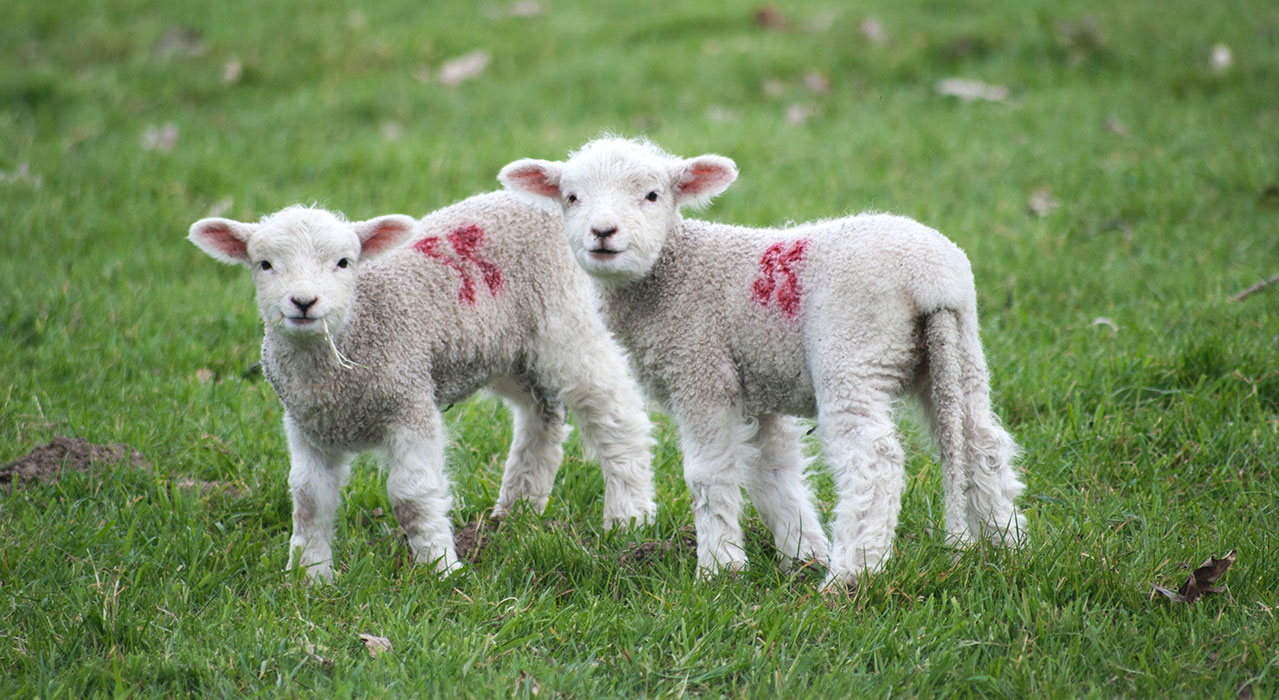Over the Easter weekend, I was delighted to see the new lambs frolicking in the fields along the motorway. I love lambs. They are just adorable. There’s something about their horizontal ears that is so appealing, and the uninhibited way they bounce around is endearing. They just always look like they’re having so much fun – running, jumping and playing, while adult sheep just look… …boring. And bored.
How does that happen? How does something as active and playful as a little lamb turn into something as serious, staid, and dull as a sheep?
I’ve always wondered.
Be more lamb
The same is true of humans though, isn’t it?
Like lambs, children are endlessly curious about the world, and move around with an uninhibited and unselfconscious vibrancy. They don’t care what they look like when they’re pretending to be aeroplanes or animals, and they can make toys out of anything – even sticks or rocks.
In comparison, grown up humans are serious beings. Like sheep.
We’ve become somewhat jaded with life, caught up in the seriousness of work, with little time for spontaneity, or fun. We think before we act, and feel silly joining in with kids’ games.
Like lambs, we too played a lot as children. We discovered the joy of moving around at speed, and over obstacles. We learned about the world by being curious about what to eat, and what to play with, and we practised life skills with the safety of our parents close by.
But then, just like lambs, most of us stopped doing ‘silly things’.
We stopped playing.
The importance of play
Intellectually, we know how important it is for our children to play.
We know that ‘messy play’ when they are babies is important to allow their sensory skills to improve.
We know that play of all kinds enables their brains to grow and develop, and allows children to learn essential life skills such as teamwork and cooperation, winning and losing.
We know that play allows children to fine tune their motor skills and their sense of balance, and we know that creative pretend play allows them to develop a sense of self and engages their imagination.
We take play very seriously on behalf of our children – we make sure that they have the latest toys and games, and encourage them to play with other children too.
And then… …we stop telling them to play.
We tell them to stop being silly and not to play with their food. We tell them to pay attention in class and not let their imagination wander. We tell them not to go out with friends but to focus on work. We tell them not to play video games and to revise instead.
But I believe that play is important at all ages, not just as babies and children.
Finding space for play
Unlike lambs, who have to settle down to the serious business of being a sheep, eating for survival; even as the grown-up adult versions of ourselves, we have the luxury of spare time between eating and sleeping.
Admittedly, we have created a life for ourselves that is a little more complicated than that of sheep in a field, but I still think there’s a place for play.
And I’m not alone – scientific research backs up the need for play to continue throughout life.
Shaping our brains through play
Once we have played solidly as children, doing all the hard work of developing our big brains and learning the sensory, motor, and social skills that are needed for us to thrive as adult humans, it is tempting to think that we no longer need to play and can put that time to use for work and other more serious pursuits.
But our brains continue to be shaped by our experiences across our while life span – so if we don’t continue to use the circuitry we created through play when we were younger, we risk losing those essential skills as we get older because our brain continually reshapes and rewires itself, according to what we DO on a daily basis.
Play, even as adults, maintains the connections between all the essential parts of our brain, keeping the wiring that we have built healthy and fine-tuned.
Grown-up play
But what counts as play once we are grown-ups?
Dr Stuart Brown, a psychiatrist and clinical researcher in America, founder of the National Institute for Play there, describes different kinds of play that he deems necessary as adults.
His findings come from various studies he has carried out, notably on ‘death row’ inmates and other prisoners in the US. As part of this work, he came to the saddening conclusion that a commonality between those convicted of serious crimes against others is a critical lack of play in their formative years.
He defines play as “a state of being, where what you’re doing is voluntary, is fun, gives you a sense of freedom and of not relying on a definite outcome, and is something you would want to do again”.
I like this definition because it means that we can define many of the activities we enjoy as adults as being ‘play’!
For example – meeting friends at the pub for a drink is play. Doing yoga, playing football, or going rock climbing is play. Baking cupcakes can be play, as can reading and drawing.
Dr Brown goes further in his definition of play and describes different kinds of play, although in practice, the categories he defines tend to overlap.
Within work done by his Institute for Play he talks about body movement and control type play, which covers team sports or yoga; while object play might involve traditional board games or toys such as Lego, maybe even DIY (if that’s something you enjoy).
Social play is covered by our interactions with friends, using humour and language together, while story telling play could be nostalgia and family recollections, or enjoying a good book.
You might imagine we do less pretend play as adults, but what else is theatre or cinema (or even cosplay!), but pretend play? In the same way, inventors, designers, and advertisers are imagining alternative ‘pretend’ realities, as are artists.
Play of all these distinctions seems to keep the circuitry in our brains that we worked hard to build as children active, and alive, providing us with a sense of pleasure, contentment, and satisfaction because it activates the reward centres in our brains, too.
Those feelings that arise as a result of play, and reward, are the positive effects of neurotransmitters that our brain uses to communicate within itself – serotonin, dopamine, and oxytocin.
Releasing these neurotransmitters during the various forms of play helps to keep us mentally healthy, allowing us to successfully make the most of the highly evolved, intellectual parts of our brain to do the serious adult work of problem solving, continuing to learn and thrive, not to mention staying physically and mentally well.
Play therapy
Our natural enjoyment of play and our preference to do things that feel ‘fun’ is one reason behind the increasing popularity of solution focused hypnotherapy. Unlike traditional talk therapy – with its focus on analysing our past, and the negative events that led to our difficulties – solution focused work looks to maximise our ability to notice the positives in our life, making the most of the things that we can do and enjoy, so that the day feels productive, full of hope for the future.
Solution focused hypnotherapists have a solid understanding of how the brain works, too, and we share that with our clients, discussing novel ways to harness those positive neurotransmitter effects by changing and adapting our behaviour.
Even the ‘hypnosis’ element of solution focused hypnotherapy sessions has a playful edge to it – it takes clients out of their everyday existence into an colourful, enjoyable imaginary world where all seems possible.
Finding ways to play
In an evolutionary sense, continuing to play as adults in this way allowed us not just to survive, but to be able to share the information we learned with others, and importantly, passing our genes on to the next generation.
Nowadays, learning to play better as adults might be the most effective way to support ourselves to be better at juggling all the things we need to in our busy, pressured, modern human lives. We could really benefit from being more aware of that innate need to play, and to find ways to weave into our daily lives. Dr Brown thinks that it is entirely possible to do that, even in a work context – who hasn’t heard of Google’s use of ball pits and bean bags to enhance creativity within their staff, and felt a little bit jealous?!
But the truth is you don’t need a ball pit to play at work – the different types of play that exist mean we can all build mini-moments of playfulness into our day just by losing ourselves in a book on our lunch break, or by using brightly-coloured pens and stationery for a fun visual in our diary.
Even reminders of previous play times can help – having your child’s collage or junk modelling nearby, choosing a picture of you all playing at the beach on holiday as your screensaver, or simply using a mug that you painted together can all act as reminders of past play – triggering the release of those all-important neurotransmitters to add the experience of a little playfulness to your day.
Time spent creatively is another way to add play to your day outside of work – there’s a reason adult colouring books have become popular in recent years, and the increasing use of resin art, crafting or scrapbooking as hobbies.
Exercise, too, can be a valuable source of ‘playtime’, and brings with it other valuable effects in terms of consolidating our place in the social world we have created.
And don’t discount escapism – mindfully choosing to get lost in a great film, or the story-telling of a stage play may just be the equivalent of the fireside gatherings of old
Playing for time
Like many of the unique aspects of our human development, play is very much linked to our success as a species. So, go and play your part in that history by finding more ways to play in your day. Stay curious; imagine and pretend, create and practice, perform and recall with just as much enthusiasm now as you did as child, and preferably with as little self-consciousness.
Your body and brain will thank you for it, and, if you have children or grandchildren, I imagine they will thoroughly enjoy joining in, too!
Claire Noyelle
https://www.afsfh.com/hypnotherapists-postcodes/216-claire-noyelle/

